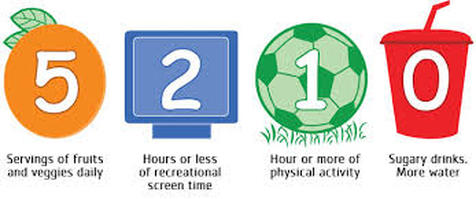|
|
 In the Western world, one out of every four children had a body mass index that puts them in the overweight category. As stated by Dr. Khalsa, "Preschool children who are overweight or obese have a four-fold odds of being overweight or obese as adults.” "Preventing obesity is critical to averting obesity-associated diseases, such as metabolic syndrome, type 2 diabetes, hypertension and cardiovascular abnormalities." The 5-2-1-0 message was started by the Maine Youth Overweight Collaborative obesity prevention program "Let's Go! 5-2-1-0" and has been promoted widely in the USA. The 5-2-1-0 guidelines recommend children eat at least five servings a day of fruits and vegetables, view less than two hours of screen time, participate in one hour of physical activity and consume no sugar-sweetened beverages daily. Numbers to Live By! A Healthy Eating, Active Living Message Aim for 5 fruits and vegetables every day A diet rich in fruits and vegetables provides vitamins and minerals, important for supporting growth and development, and for optimal immune function in children. In adults, a high daily intake of fruits and vegetables is associated with lower rates of chronic diseases such as heart disease, stroke, high blood pressure, diabetes and possibly some types of cancer. Emerging science suggests fruit and vegetable consumption may help prevent weight gain, and when total calories are controlled may be an important aid to achieving and sustaining weight loss. Keep recreational screen time to 2 hours or less every day Watching television occupies many children for several hours each day and is associated with physical inactivity, increased energy intake, exposure to marketing (while sitting in front of the TV, many people snack more than they should) and increased prevalence of overweight and obesity. The American Academy of Pediatrics (AAP) recommends that children under age 2 not watch any television. Too much TV has been linked to lower reading scores and attention problems. Include at least 1 hour or more of active play every day Regular physical activity is essential for fitness and prevention of overweight and chronic diseases such as heart disease, diabetes, colon cancer and osteoporosis. While most school-age children are quite active, physical activity sharply declines during adolescence. Children who are raised in families with active lifestyles are more likely to stay active as adults than children raised in families with sedentary lifestyles. Skip sugar sweetened beverages, drink more water every day Sugar-sweetened beverage consumption has increased dramatically over the past 20 years; high intake among children is associated with overweight and obesity, displacement of milk consumption and dental cavities. Whole milk is the single largest source of saturated fat in children’s diets. Switching to low, non-fat or alternative plant milk products significantly reduces dietary saturated and total fat, as well as total calories.
0 Comments
Leave a Reply. |
AuthorBarbara is a qualified nutritionist offering Health, Nutrition & Lifestyle Counseling. She gives Healthy weight loss advice and promotes the Mediterranean diet. She is the author of the Med Life Diet - creating healthy lifestyle habits and attitudes for life ! Archives
April 2024
|
 RSS Feed
RSS Feed
